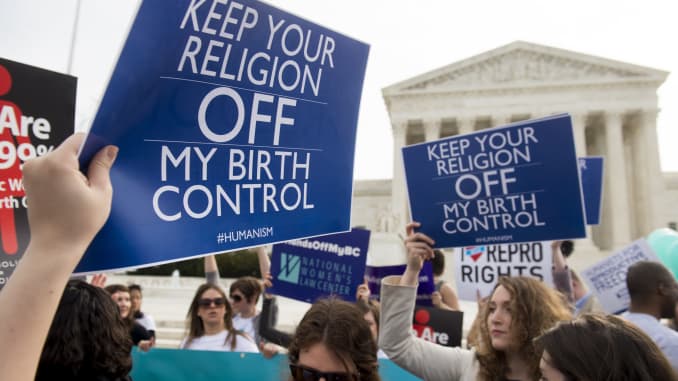- The justices of the Supreme court on Wednesday clashed along largely partisan lines in a dispute over Trump administration rules that would allow employers with sincerely held moral or religious objections to deny their employees access to free contraceptive coverage.
- Pennsylvania and New Jersey successfully halted implementation of the regulations in the lower courts. The Trump administration, via the Department of Justice, and the Catholic nonprofit Little Sisters of the Poor asked the Supreme Court to reverse those rulings.
- It was not immediately clear which side will garner enough votes to form a majority. If the Trump administration wins, more than 125,000 women could lose their contraceptive coverage, according to government estimates.

The justices of the Supreme court on Wednesday clashed along largely partisan lines in a dispute over Trump administration rules that would allow employers with sincerely held moral or religious objections to deny their employees access to free contraceptive coverage.
Pennsylvania and New Jersey successfully halted implementation of the regulations in the lower courts. The Trump administration, via the Department of Justice, and the Catholic nonprofit Little Sisters of the Poor asked the Supreme Court to reverse those rulings.
Arguments, which were conducted by phone as a precaution against the spreading coronavirus, lasted nearly two hours and concluded shortly before noon. A decision is expected over the summer.
It was not immediately clear which side will garner enough votes to form a majority. If the Trump administration wins, more than 125,000 women could lose their contraceptive coverage, according to government estimates.
The high-profile case comes as President Donald Trump is seeking reelection in November. Trump campaigned in 2016 on opposing the contraceptive coverage mandate and won with broad support among religious groups.
Trump’s Democratic rival, Joe Biden, was vice president at the time the provision that would become the contraceptive coverage mandate was signed into law as part of the Affordable Care Act, the health-care overhaul commonly known as Obamacare.
Liberal justices, including Justice Ruth Bader Ginsburg, who called in from Johns Hopkins hospital in Baltimore after being treated for a benign gallbladder condition on Tuesday, argued that the Trump administration was unlawfully departing from Congress’s intention to provide women with free contraceptive coverage when it passed the Affordable Care Act in 2010.
“You have just tossed entirely to the wind what Congress thought was essential — that women receive these services with no cost, no hassle to them,” Ginsburg told Solicitor General Noel Francisco, who argued on behalf of the Trump administration.
Justice Brett Kavanaugh, a Trump appointee, said the case was “difficult,” noting that there were “very strong interests on both sides.”
Under rules put out under President Barack Obama, churches and other houses of worship were exempted from the contraceptive coverage mandate. Religious nonprofits were entitled to an “accommodation” in which their employees would receive contraceptive coverage, but they would not have to pay for it.
The Supreme Court expanded the accommodation to some for-profit businesses in the 2014 case Burwell v. Hobby Lobby Stores, though religious employers have argued ever since that even having to notify the government or their insurer of their religious objection makes them “complicit” in providing the coverage.
In 2016, the Supreme Court declined to issue a substantial ruling in a case involving those objections.
The justices instead urged the Obama administration to work on a compromise with religious objectors. The administration said shortly before Trump took office that it was unable to do so “while still ensuring that the affected women receive full and equal health coverage, including contraceptive coverage.”
Chief Justice John Roberts, who was part of the 5-4 majority in Hobby Lobby, seemed exasperated that the government still had not worked out a compromise.
“The problem is that neither side in this debate wants the accommodation to work,” Roberts told Paul Clement, an attorney for the Little Sisters of the Poor.
The argument was the third of 10 to be heard virtually during the first two weeks of May, the first virtual arguments in the court’s history. As in the prior two arguments, Justice Clarence Thomas, who is known for his silence, asked questions.
The case appears to be the first virtual argument in which Covid-19 became an element of the discussion. Justice Sonia Sotomayor, an Obama appointee, asked Clement if it would be lawful, hypothetically, for religious groups to object to a mandatory requirement to provide Covid-19 vaccines.
“In the context of Covid-19, I think the government might be able to meet its burden” of requiring the vaccine to be provided, Clement said.
Clement and Francisco argued that the exemptions for religious employers are required under the 1993 Religious Freedom Restoration Act. The RFRA prohibits the government from imposing a substantial burden on the exercise of religion unless it can show that it is using the least onerous means of doing so.
Pennsylvania Chief Deputy Attorney General Michael Fischer, who argued on behalf of the states, argued that the administration failed to follow the Administrative Procedure Act, which governs agency rulemaking, when it came up with the new rules.
“The prior rules struck a balance that permitted objecting employers to opt out but still allowed their female employees to receive coverage,” Fischer said.
Arguing that the Trump administration rules swept too broadly, Fischer noted that even publicly traded companies could claim exemptions under them, despite the fact that none had publicly said they were seeking one.
The cases are known as Donald Trump v. Pennsylvania, No. 19-454, and The Little Sisters of the Poor Saints Peter and Paul Home v. Pennsylvania, No. 19-431.